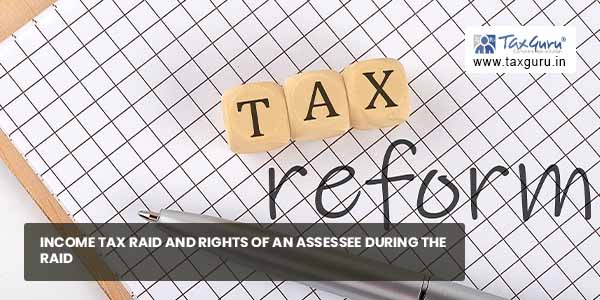An income tax raid is an operation of search and seizure which is conducted by the income tax department on the business or residential premises of taxpayers with an objective to reveal all the undisclosed income of the assesses. This is one of the most important powers given to the Income Tax Department whereby the tax authorities can exercise their right to conduct raids on individuals or groups who are suspected of evading tax during the financial year in any manner.
Page Contents
Objectives Of Income Tax Search and Seizure:
The Income Tax Department exercises its right of search and seizure due to the following reasons:
- To ensure to avoid any threat to social security or integrity of the country by smuggling, public disorder, fraud, terrorism, etc.
- To address any problems and issues that may arise due to tax evasion and avoidance of tax
- To unearth or reveal any black money held in the custody of the assessee exceeding the value of Rs. 1 crore
- To uphold the provisions of laws laid down by the constitution of India
- Where the department has acquired any information relating to tax evasions by any state or central government law enforcement agency.
Who Can Conduct a Income Tax Raid?
According to Section 132(1) of the Income Tax Act, the Additional Director, or Additional Commissioner, or Joint Director, or Joint Commissioner, or Assistant Director, or Deputy Director, or Assistant Commissioner, or Deputy Commissioner, or any other income-tax Officer on being authorized by Principal Director General or Director-General, or Principal Director or Director, or Principal Chief Commissioner or Chief Commissioner, or Principal Commissioner or Commissioner can conduct a tax raid if he has a “reason to believe” that
- A taxpayer has failed to comply with any summons or notices sent to him by the Department or
- He has in his possession either wholly or partly any income or property which has not been disclosed while filing his ITR.

Powers of Tax Authorities During a Income Tax Raid:
The officer authorized to carry out the raid can:
- Enter and search any building, place, etc. where he has a reason to suspect that any valuable article or thing which has been undisclosed is kept.
- Break the locks, where the keys are unavailable.
- Carry out a personal search of a person or seizure of several items which is suspected to have some disclosed items in possession
- Take extracts or copies of the books of account and other relevant documents.
- Make a note or inventory of the valuables found during the search.
Rights Of an Assessee During a Income Tax Raid:
- To insist on the personal search of ladies being taken only by a lady, with strict regard to decency
- To have at least two respectable and independent residents of the locality present in the premises as witnesses
- To call a medical practitioner in case of emergency
- To allow the children to go to school, after checking their bags
- To have meals, medicines, etc. at the normal time
- To have a copy of the panchanama together with all the relevant annexures
- To have a copy of any statement that can be used against him by the Department.
Rights Available to The Person After Income Tax Raid:
If an assessee feels that he or she has been wrongly raided by the income tax department, he or she can challenge the raid carried out by filing before the Commissioner of Income Tax (Appeals). The person can even file a writ petition of Mandamus with the High Court under article 226 of the constitution. After the Income Tax Department has conducted a seizure of all documentation or undisclosed property under suspicion, it can re-conduct an assessment for the six years prior to the conclusion of the raid for any reason it deems fit.
****
The author Sushant Gangurde is a legal analyst @Taxblock India who aims to educate people about various tax laws and financial planning.






i will not paid income tax